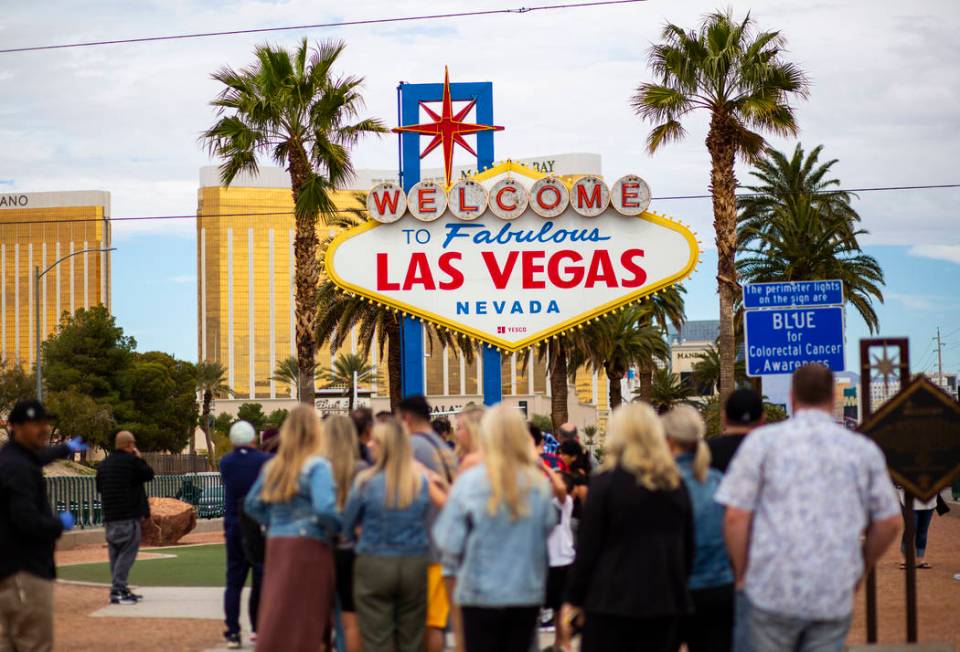Effects of coronavirus fear hit Las Vegas economy hard

The spreading coronavirus has sparked financial shock waves around the globe at breakneck speed, from stock market plunges to waves of canceled events and other closures.
As people avoid big gatherings over fears of the virus, Southern Nevada could face severe economic problems, observers said, given its lucrative convention industry and high dependence on tourism — businesses centered on masses of people, from around the country and globe, crammed together here.
Las Vegas welcomes more than 40 million visitors a year, the majority arriving by plane, and the foundation of its economy is the Strip, where throngs of people gather daily — sometimes elbow-to-elbow — in casinos, restaurants, clubs, malls and convention halls.
The new coronavirus is known to have infected a tiny fraction of the U.S. population, and far more people globally have recovered from it than have died. It’s also too early to gauge the overall economic impact the virus is having on Las Vegas, given how new the crisis is and the lack of available data.
But the virus has spread quickly, sparked widespread fear and led to rapid closures. At least 17 Las Vegas conferences, comprising an estimated 290,000-plus combined visitors, had been canceled or postponed as of Thursday.
The NCAA basketball tournament known as March Madness also was nixed Thursday. The event is a financial boon for Las Vegas, with gamblers betting an estimated $346.6 million on the tournament in Nevada sports books last March.
Overall, some consumer spending will stay strong during the coronavirus pandemic, including for food and health care, but there could be “steep cutbacks” on air travel, hotels and restaurants, Wells Fargo Securities senior economist Tim Quinlan told the Las Vegas Review-Journal.
“I would think Las Vegas is considerably more exposed to the retrenchment in those categories than most other cities,” he said.
‘Could be significant’
Visitors spent $34.5 billion in Southern Nevada in 2018, directly supporting more than 234,000 tourism jobs, according to a report by local consulting firm Applied Analysis for the Las Vegas Convention and Visitors Authority. Conventioneers directly supported 42,800 jobs.
The economic effects of the coronavirus are changing globally “on a minute-by-minute basis,” though if major events keep getting canceled, and travel plans are further slashed, the implications for Nevada “could be significant,” Applied Analysis co-owner Brian Gordon said.
Stephen Miller, director of UNLV’s Center for Business and Economic Research, noted there are still plenty of unknowns, including how widespread the virus will become.
But he said it is “clearly going to affect the tourism sector,” and if the virus leads to severe economic damage and a recession, Las Vegas would “probably feel it more than other metro areas.”
Rosa Mendez, spokeswoman for the Nevada Department of Employment, Training and Rehabilitation, said department officials “don’t have anything to announce yet” concerning the virus’ economic impact.
The LVCVA, which is funded mostly by hotel room taxes, expects a reduction in revenue “over at least the next couple of months,” President and CEO Steve Hill said at a board meeting Tuesday.
“It’s a challenging time, there’s no question,” he said, adding it “hit quickly.”
The convention authority declined further comment.
Cancellations pile up
The coronavirus, which causes a respiratory disease known as COVID-19, has spread around the world from China in the past few months since it was first reported Dec. 31, 2019. Globally, there were more than 127,860 confirmed cases, 68,310 recoveries and over 4,700 deaths as of Thursday, according to Johns Hopkins University.
The Southern Nevada Health District was reporting eight cases in Clark County as of Thursday. The Nevada total included 11 cases as of Thursday evening.
Las Vegas, whose economy was humming along after years of recovering from the Great Recession, has seen a burst of canceled or postponed conferences the past week or so amid fears of the virus. As people cut travel plans here and elsewhere, the aviation industry expects to take a big hit financially.
U.S. airports could lose at least $3.7 billion this year because of the abrupt decline in air travel stemming from the outbreak, Kevin Burke, president and CEO of Airports Council International–North America, said in a statement Thursday.
McCarran International Airport does not have real-time passenger numbers, spokeswoman Christine Crews said Thursday, as the airlines report figures to McCarran after they compile monthly totals.
Historical travel patterns can be used to help produce passenger forecasts, she said, but the coronavirus has created “a unique situation.”
“That doesn’t apply here,” she said.
Contact Eli Segall at esegall@reviewjournal.com or 702-383-0342. Follow @eli_segall on Twitter.